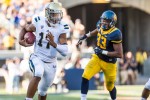“I want to be somebody. I want to have people look back on it later and say, ‘He did something while he was here and he made a statement, he made a history.’ I want to leave a legacy.”
Those were the words spoken by quarterback Brett Hundley prior to his redshirt freshman season when he took over as UCLA’s starter. Three years later, Hundley is heading into his last game as a Bruin in the Valero Alamo Bowl against Kansas State, making no better time for a little retrospection.
Sure, Hundley’s been a star for UCLA, but what will his legacy really end up being?
First, a little history lesson is in order.
In the 13 years between quarterback Cade McNown’s departure in 1999 and Hundley taking over in 2012, UCLA rarely had continuity at quarterback. For the first four years, either two or three quarterbacks would attempt 60 or more passes each year, as inefficiency or injuries kept one player from winning the job outright.
Finally in 2003, the Bruins got some stability at the position, with Drew Olson holding down the starting spot for three seasons. After that, things were borderline disastrous, with five of the next six seasons consisting of two quarterbacks essentially splitting time, due to injuries or simply not having a sure-fire starting option.
Unsurprisingly, UCLA’s success during this period mirrored its turmoil at quarterback, with six losing seasons, five winning seasons and two years at .500 from 1999 through 2011. Overall, the Bruins went 81-80 (.503) over that 13-year stretch.
Then along came Hundley.

For the first time in years, UCLA went into its season without a quarterback controversy and there’s been none since. In Hundley’s three years, UCLA is 28-11 (.718).
But even with the historic turnaround of the program, Hundley hasn’t been without criticism, with some analysts blaming Hundley’s lack of development for holding the Bruins back as the team was unable to achieve its goal of winning a Pac-12 title with Hundley.
The critics have a point.
Hundley’s stats show his accuracy has improved, but his interceptions, passing yards and passing touchdowns have decreased in each of the past two seasons.
The eye test doesn’t work in Hundley’s favor either. Many of the problems that plagued him in 2012 – namely his tendencies to hold onto the ball and to stare down one receiver for too long without progressing through his reads – still remained a problem this season.
Another knock has been how these Hundley-led UCLA squads have mirrored their quarterback’s development, winning nine regular-season games for three straight years while failing to beat Stanford or Oregon. As a result, Hundley will leave UCLA without having won a Pac-12 title or reached a top-level bowl game.
Had Hundley improved more over the past two years, UCLA’s title hopes may have become a reality.
However, placing any blame on Hundley for UCLA not becoming a legitimate contender is narrow-sighted and invalid. Hundley has been just as instrumental as coach Jim Mora in turning UCLA into a respected program.
Just think of the struggles the Bruins had under quarterbacks Kevin Prince and Richard Brehaut in 2011 – and for most of the decade before that – then look at all that Hundley has done in their place.
Hundley’s very first play from scrimmage was as auspicious as they come, running 72 yards past the Rice defense for a touchdown. Look back at his scramble against Nebraska last season, escaping two sacks and taking off for a first down on third-and-12 to help propel UCLA to its comeback victory. Those are plays UCLA hasn’t been able to make in a long time from a player unlike one UCLA has had in a long time.
Then there was his phenomenal game against Virginia Tech in last year’s Sun Bowl, running and throwing for two scores apiece, including a huge 86-yard touchdown run, weaving around defenders then outsprinting a trailing safety.
After that performance, his draft stock at its peak, Hundley still elected to come back to the Bruins for one more year.
“I came to UCLA for this specific reason, not to just do something for the program, not just me personally, but help bring this team back to national prominence,” Hundley said at his return announcement last January.
UCLA, like Hundley, may not have achieved elite national status over the past three season, but it came close. Considering where the program was when Hundley arrived on campus, that’s an impressive enough feat.
So was Hundley UCLA’s savior as he was hailed coming in, or was he just a good quarterback that happened to play for a good team with good coaches?
The answer is an indisputable nod in Hundley’s direction and the reasoning lies in the legacy that he will leave behind.
Beyond all the UCLA records he holds – single-season completions, single-season total offense, single-season passing yards and career passing touchdowns – Hundley ushered in a new era of UCLA football, bringing the Bruins from irrelevancy to the cusp of greatness.
He led a changing of the guard in Los Angeles, setting UCLA ahead of USC in the crosstown battle for three straight seasons for the first time since the ‘90s.
He made the incredible a routine, breaking tackles, scrambling for first downs and bringing a consistency to the quarterback position UCLA lacked for years.
He set a new standard for quarterback play at UCLA, leaving incoming freshman Josh Rosen a huge paradigm to live up to.
Brett Hundley did something while he was here – he made a statement, he made a history.
